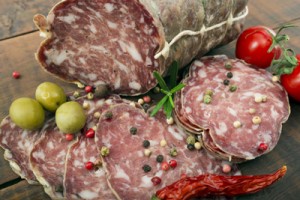Project to develop processed meats with antioxidants
- Like
- Digg
- Del
- Tumblr
- VKontakte
- Buffer
- Love This
- Odnoklassniki
- Meneame
- Blogger
- Amazon
- Yahoo Mail
- Gmail
- AOL
- Newsvine
- HackerNews
- Evernote
- MySpace
- Mail.ru
- Viadeo
- Line
- Comments
- Yummly
- SMS
- Viber
- Telegram
- Subscribe
- Skype
- Facebook Messenger
- Kakao
- LiveJournal
- Yammer
- Edgar
- Fintel
- Mix
- Instapaper
- Copy Link
Posted: 11 November 2015 | Victoria White | No comments yet
Researchers have launched a joint project to reduce the risk of colon cancer by researching the effects of adding antioxidants to processed meats…


An EU-funded research project aims to make sausages, burgers and other meat products healthier in the future.


Researchers at Lund University, the Swedish University of Agricultural Sciences (SLU) and four other European research institutions have launched a joint project to reduce the risk of colon cancer by researching the effects antioxidant-enriched processed meats have on the development of the disease in animal models.
Making processed meats healthier is a high priority among the world’s food researchers – not least after the World Health Organisation (WHO) recently classified smoked and processed meat products as Group 1 carcinogens.
Eva Tornberg, professor of Food Technology at Lund University, thinks that WHO should have waited to issue their warning about the meats, as it is not yet clear what causes colon cancer because the statement was made based on purely epidemiological studies.
“Meat is a nutritious and non-allergenic food product, with high levels of protein as well as high levels of necessary minerals and vitamin B. Making a serious statement like that about such a basic food product will perhaps make people no longer adhere to the warnings”, says Eva Tornberg.
Processed meat prepared with antioxidants
Eva Tornberg, Åsa Håkanssson and doctoral student Stina Burri of Food Technology at the Faculty of Engineering (LTH) at Lund University, together with Kimmo Rumpunen at Balsgård, SLU, are currently conducting an EU-level research project, together with a number of other European partner institutions. The project aims to minimise oxidation in processed meat products, which, according to their hypothesis, will lead to a reduction of colon cancer.
Simply explained, the project involves extracting antioxidants from plants and berries. The antioxidants are then used to prepare meat products. Animal models will afterwards show whether this reduces the occurrence of cancer or not.
“If this hypothesis proves to be true, it will indicate that the risk of colon cancer can be reduced by eating a balanced diet – in other words, together with meat, eat lots of vegetables and other things that contain antioxidants. In short, the old ‘model plate’ diet could once again prove to be beneficial. Sausages prepared with antioxidants could be an option to reduce the risk of those who, despite all the advice, still do not get enough antioxidants”, says Eva Tornberg.



